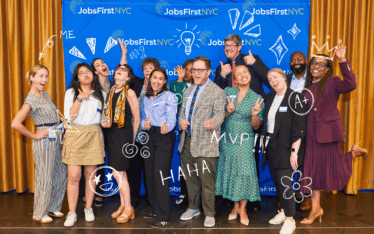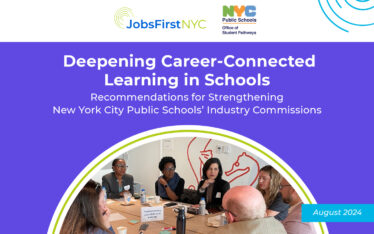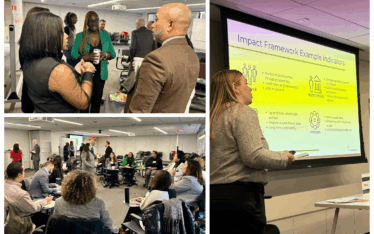This past month (September 2023), we experienced the overlap of Climate Week and Workforce Development Month, offering a timely reminder of the pivotal role that our workforce plays in shaping the trajectory of climate action.
Tackling climate change requires more than just technological innovation and policy change; it demands a skilled and adaptable workforce capable of creating and implementing sustainable practices, developing green technologies, and driving the transition to a low-carbon economy.
As we grapple with the consequences of a warming planet, the demand for green jobs, innovative solutions and entrepreneurial ventures continuously rises. This intersection compels us to explore how workforce development can catalyze climate action and to reflect on the collective action witnessed over the last month.
How JobsFirstNYC Plays a Role in Climate Action: The Green Economy Network
The Green Economy Network, launched by JobsFirstNYC, is a dynamic partnership between workforce development agencies, community-based organizations, and employers shaping New York City’s green economy. The Network commits to fostering partnerships, understanding industry needs, and empowering job seekers with the knowledge and training required for green careers. The network also advocates for government investment, recognizing the critical role of policy in shaping the green workforce.
The Green Economy Network is an example of how collaborative efforts and innovative strategies can simultaneously address the pressing challenges of climate change and economic inequality by enhancing green skills training, leveraging knowledge and resources, and increasing access to high-quality, in-demand jobs. This resounding theme echoed throughout Climate Week.
Key Highlights: Reflections on Climate Week 2023
As we reflect on Climate Week, two discussions come to mind, as they contributed actionable strategies and ideas for collaboration at the intersection of sustainability and workforce development.
Nature, Food Systems & Health: Young Adult Eco-Optimism
During a stand-out panel titled “From Eco-Anxiety to Eco-Optimism,” young adult activists shared insights into climate change from their perspective – those who witness its daily impacts.
We heard from Aria Mia Loberti, Gautam Narasimhan, Kripa Kannan, Madina Kiramo, and moderator Jay Lipman. Here are a few key themes:
- Leveraging Youth Optimism for Climate Action: A recurring thread throughout the discussions was the importance of empowering young people to participate in climate action. Loberti highlighted the confidence gap that often prevents young individuals from speaking out in their communities. Panelists emphasized the need to equip the younger generation with the tools, literacy, and confidence to engage effectively in climate activism.
- Prioritizing Green Jobs and Skill-Building: Narasimhan stressed that climate change is not a distant problem but a pressing issue that affects the younger generation directly. We must incorporate climate education into school curricula and ensure young people are trained to tackle environmental challenges actively.
- Funding Young Adult Innovation and Entrepreneurism: The prevailing sentiment among today’s youth is not despair but rather a relentless optimism that fuels their commitment to action, often resulting in profound innovations. The panelists called for older generations to engage with young activists as equal partners, provide funding, and create avenues for bringing their innovative ideas to market.
Kiramo stated an overarching takeaway: “Nothing for us without us,” emphasizing the importance of youth collaboration and leadership in shaping climate solutions. The group advocated for meaningful participation by giving young individuals a voice at the table rather than tokenizing their input.
Fireside Chat with Alexandra van der Ploeg, Head of Corporate Social Responsibility, SAP
Following the young adult panel, a fireside chat featured the Head of Corporate Social Responsibility at SAP, Alexandra van der Ploeg. She stated, “Sustainability is no longer a side endeavor but an integral part of business strategy.” van der Ploeg explored how companies can reshape their practices:
- Corporate Responsibility and Integration: Corporations must transition from viewing sustainability efforts as philanthropic endeavors to recognizing the need for integration into their core business strategies.
- Green Economy Job Skilling: The green economy can simultaneously generate social impact and business growth. With the projection of new jobs in AI and green technologies, there is a pressing need to prepare the workforce.
- Youth Engagement and Collaboration: When young climate activists approach corporate leaders, it is insufficient to merely listen to their concerns. True collaboration involves co-development, where young activists are recognized as the experts they are.
The Intersection of Workforce Development and Climate Change
Our reflection on last month’s events reminds us that green jobs are not simply employment opportunities; they are a conduit for positive environmental impact, a means to redirect industry toward a more sustainable future, and a door to economic mobility for individuals and communities.
Building this workforce requires an investment in education and training programs that equip job seekers with the knowledge and skills to contribute meaningfully to climate action. It also involves fostering a culture of lifelong learning, where workers continuously upskill and adapt to emerging needs presented by a changing climate.
To learn how you can get involved in the Green Economy Network and shape the future, sustainability-focused workforce, contact Megan Marshall at mmarshall@jobsfirstnyc.org.





